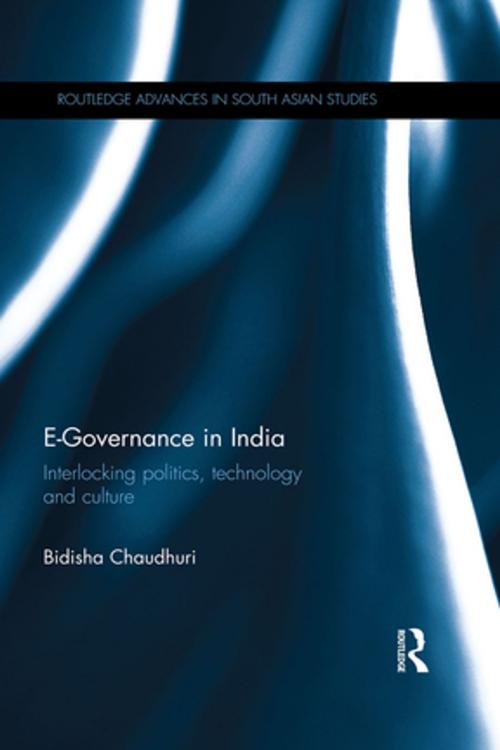E-Governance in India
Interlocking politics, technology and culture
Nonfiction, Social & Cultural Studies, Social Science, Cultural Studies, Ethnic Studies, Political Science| Author: | Bidisha Chaudhuri | ISBN: | 9781317686767 |
| Publisher: | Taylor and Francis | Publication: | June 5, 2014 |
| Imprint: | Routledge | Language: | English |
| Author: | Bidisha Chaudhuri |
| ISBN: | 9781317686767 |
| Publisher: | Taylor and Francis |
| Publication: | June 5, 2014 |
| Imprint: | Routledge |
| Language: | English |
E-Governance has been one of the strategic sectors of reform in India since late 1990s under the rubric of ‘good governance’ agenda promoted by International Organizations. As India’s policy focus changed towards economic liberalization, deregulation and privatization proliferating domestic and foreign investment, ICT (Information Communication Technology) has been one of the leading areas for such heightened investment. Consequently, there has been a burgeoning interest in deploying ICT, in revamping the public service delivery and eventually the overall system of governance.
This book analyses e-Governance in India and argues that such initiatives did not take place in isolation but followed in the footsteps of broader governance reform agenda that has already made considerable impact on the discourses and practices of governance in India. Employing interdisciplinary methodology by combining approaches from the Political Sciences, Sociology and Postcolonial/ transcultural studies, this book presents a qualitative account of the policies and practices of e-Governance reform in India along with a detailed case study of the Common Services Centres (CSCs) Scheme under the National e-Governance Plan of the Government of India and its resultant impact on the overall system of governance. It unfolds general theoretical issues in terms of the relationship between technology and governance and the entanglement of politics, technology and culture in the complex whole of governance. This furthers our understanding of the impact of the transnational governance reform agenda on post-colonial and post-communist societies of the developing world.
Making an important and original contribution to the emerging field of e-Governance and to the existing body of research on governance in general, this book will be of interest to students and scholars of Political Science, Political Sociology, South Asian Politics and Governance.
E-Governance has been one of the strategic sectors of reform in India since late 1990s under the rubric of ‘good governance’ agenda promoted by International Organizations. As India’s policy focus changed towards economic liberalization, deregulation and privatization proliferating domestic and foreign investment, ICT (Information Communication Technology) has been one of the leading areas for such heightened investment. Consequently, there has been a burgeoning interest in deploying ICT, in revamping the public service delivery and eventually the overall system of governance.
This book analyses e-Governance in India and argues that such initiatives did not take place in isolation but followed in the footsteps of broader governance reform agenda that has already made considerable impact on the discourses and practices of governance in India. Employing interdisciplinary methodology by combining approaches from the Political Sciences, Sociology and Postcolonial/ transcultural studies, this book presents a qualitative account of the policies and practices of e-Governance reform in India along with a detailed case study of the Common Services Centres (CSCs) Scheme under the National e-Governance Plan of the Government of India and its resultant impact on the overall system of governance. It unfolds general theoretical issues in terms of the relationship between technology and governance and the entanglement of politics, technology and culture in the complex whole of governance. This furthers our understanding of the impact of the transnational governance reform agenda on post-colonial and post-communist societies of the developing world.
Making an important and original contribution to the emerging field of e-Governance and to the existing body of research on governance in general, this book will be of interest to students and scholars of Political Science, Political Sociology, South Asian Politics and Governance.















